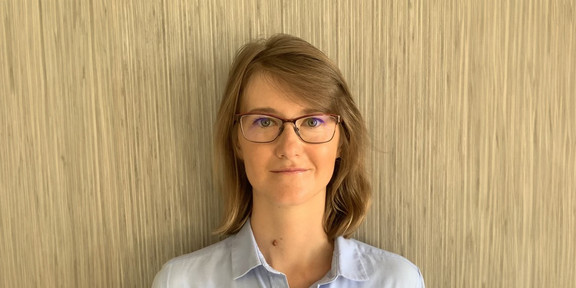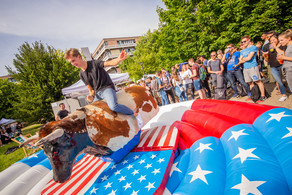"My PhD from TU Dortmund University is meaningful"

Magda H. Barecka is an Assistant Professor of Chemical Engineering at Northeastern University in Boston (USA). During her stay at TU Dortmund University, she earned her PhD and has then continued to advance her career both in the industrial and academic sector. In this interview, she talks about her current research and how staying at our university influenced her career.
Can you give us an insight into your career path so far?
I got my Bachelor’s and my Master’s degree from Lodz University of Technology in Poland. I did the research for my PhD at TU Dortmund University’s Department of Biochemical and Chemical Engineering and got a double diploma from both universities in September 2017. I was excited to discover that the methodology that I developed during my PhD studies triggered significant industrial interest, and I had the opportunity to apply the method at the French company Processium. Subsequently, I joined the large process design company Morgan Sindall Professional Services AG (Basel, Switzerland) active in pharmaceutical and fine chemicals process design.
While my industrial experience was very enriching, I was eager to have a broader impact, and be able to contribute to development of technologies that will change the way that the chemical industry operates. I was interested in working on disruptive technologies, very different from what we do today. Therefore, after a year and half in Switzerland, I transferred from the industry back to academia and accepted a postdoc position at the University of Cambridge at their overseas research centre in Singapore (CARES). There, I worked on CO2 conversion to hydrocarbons by means of electrolysis. Intrigued by so many unsolved challenges in CO2 electrolysis space, I developed my own research program. Last August, I joined Northeastern University in Boston as an Assistant Professor and I lead the group working on accelerated development of CO2 electrolysis technologies.
How did your time in Dortmund shape your career path? What impact did it have?
The impact of my three years in Dortmund was amazing, and looking back, I didn’t anticipate anticipating that. The skills that I developed proved to be very important for problem solving. Looking at my experiences, it has always seemed that my PhD degree from TU Dortmund University was seen as very valuable in both the industry and academic context. Whenever I was saying that I got my PhD degree from TU Dortmund University, it was recognized and meaningful.
Are there any special memories of your time at our university?
I especially remember the sense of community that we used to have as a team of PhD students. Sometimes we were a group of around 20 to 30 people going to the “Mensa” (the cafeteria). I very much enjoyed the small habits, such as having coffee or lunch together. It was helpful and important to international students to be integrated and to become a part of the team.
Right now, with your new job in Boston, how would you describe your everyday working life, like a “typical Tuesday”?
The best part of being a Professor is that there is no such thing as a “typical day”! My days are split up into working in different areas, like research, teaching, service to the institution, interaction with the National and Global Chemical Engineering Community, and collaborating with industrial partners. I mostly enjoy mentoring my students, meeting with them, and discussing science. It is a privilege to work with so talented, curious, and motivated minds! Besides leading my wonderful team, I spend lots of time developing new research proposals, teaching, chairing conferences, and networking. Being a University Professor gives an opportunity to be involved in so many diverse activities that I can’t imagine ever getting bored in this role!
If you had to describe what your research is about to someone who has no idea about chemical engineering or process engineering, how would you describe it?
My research focuses on finding new ways of producing chemicals - ways that are not harmful to the environment. Instead of extracting fossil fuels, which is associated with a negative environmental impact, we want to produce the very same chemicals from what is already available in the environment, such as carbon dioxide in the air. We are using renewable energy to convert it directly into chemicals convenient for further processing, such as ethanol, ethylene or propanol.
Therefore, my research open pathways to more sustainable, clean, environmentally friendly future where the basic human needs for healthcare and hygiene products, materials and clothing are satisfied through a selective and efficient transformation of carbon dioxide from the air into the next generation of chemical building blocks.
What differentiates my group is that we are very much focused on scalability: That means that we do not want our research to be impactful in the laboratory only, but we think a lot about how these technologies can be deployed in the industry on larger scales. It comes in very helpful that I worked in the industrial sector.
What would be your ultimate tip for new students who are just getting into the field and starting their studies?
What is so unique about chemical engineering is that we can apply the skills that we learn in almost any industry. The ability to design and understand processes is very impactful, and we can use it in any field where there are processes that need to be understood, optimized, and operated. I would encourage students to think very broadly about what they find interesting and challenging and find ways to explore these areas – often, they have much broader career choices than they might think.
Are you still in touch with people at TU Dortmund University?
Yes, for example, I gave a guest lecture in 2021. I am staying in contact because I have really good memories about my time in Dortmund. It is a pleasure to stay in touch!
To learn more about Magda H. Barecka’s group, visit https://bareckalab.sites.northeastern.edu


